A coalition of human rights organisations operating under the umbrella name of e-RIGHTS Project has raised concerns over internet disruptions in Nigeria because of the recent protests against high cost of living.
The coalition said that by deliberately disrupting internet services, the Nigerian government was effectively silencing citizens, hindering their ability to access information, engage in public discourse and exercise their civic rights.
A statement by the Executive Director of Centre for Information Technology and Development (CITAD), Yunusa Zakari Ya’u, frowned against any form of internet disruption, shutdown or stifling of dissent.
He called on the Federal Government to stop all forms of internet disruptions and uphold the constitutional rights of its people.
According to him, the e-RIGHTS project is aimed at enhancing digital rights in Nigeria and is being implemented CITAD, Spaces for Change (S4C) and Lawyers without Borders.
The statement reads, “Nigeria is a signatory to several regional and international human rights treaties, including the African Charter on Human and Peoples’ Rights (ACHPR) and the International Covenant on Civil and Political Rights (ICCPR).
“These instruments guarantee the rights to freedom of expression, assembly, and association.
“Domestically, Chapter Four of the Nigerian Constitution enshrines these fundamental freedoms. The internet has become an indispensable tool for exercising these rights in the 21st century.
“We join civil society organizations (CSOs) in Nigeria to advocate against any form of internet disruption, shutdown or stifling of dissent. We urge the Nigerian government to cease all forms of internet disruptions and uphold the constitutional rights of its people.
“This act is not unprecedented, the ECOWAS Court of Justice’s ruling against Nigeria following the Twitter ban sets a significant precedent, highlighting the unconstitutionality of these actions. The Court’s decision held that such bans and disruptions are illegal and violate the rights to freedom of expression and access to information.”










